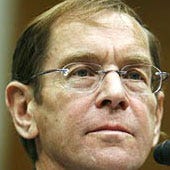A sword of Damocles over the administrative state
What's so bad about making Congress do its legislative homework?
In today’s Washington Post, “The Supreme Court could defang federal rulemaking forever,” Ruth Marcus, a student colleague of mine at Harvard Law School, frets that the U.S. Supreme Court seems poised to overrule a precedent, Chevron v. NRDC (1984), that licenses executive branch regulators to interpret characteristically ambiguous or internally contradictory congressional statutes to mean anything they want (and to reverse themselves like a human weather vane) short of derangement.
Chevron has fueled a Leviathan administrate state that issues 30 times more legislative rules annually than Congress enacts. The administrative state creates a huge moat around “to big to fail” companies that can afford $2,000 per hour lawyers capable of navigating the impenetrable Federal Register and Code of Federal Regulations.
Chevron was born of congressional cravenness and dereliction. Political genius in Congress is cobbling together regulatory statutes that are politically fetching to all Members through use of infinite ambiguity which enables everyone to claim victory to their constituents irrespective of partisan affiliation. If the regulators interpret the ambiguity in a way they dislike, bureaucrats are blamed instead of the dereliction of congressional duty in standardless delegations of power to write laws.
Columnist Marcus falsely describes the choice as having unschooled judges write laws or unelected bureaucratic experts. That choice ignores the source of the problem: Congress writing laws more obscure than the Pharaoh’s dreams presented to Joseph. The Chevon problem would be moot if the Supreme Court declared infinitely vague congressional regulatory statutes null and void for failure to satisfy the constitutional specificity standard for legislation in lieu of jawboning or advising.
Such a ruling would downsize the administrative state enormously because requiring a consensus in Congress, with all its checks and balances and compromises, before any encroachment on economic liberty. Members of Congress could no longer hide from their administrative state handiwork through nonfeasance. Making the buck stop with Congress promotes electoral accountability and government by the consent of the governed.
What about expertise in the digital age? Congress has plenary power to retain or summon any experts it wants to assist the legislative process. The executive branch does not have a monopoly, and the expertise it uses is commonly corrupted by ulterior motives.
Depend upon it. If Congress were required to vote on all the pages in the Federal Register and the Code of Federal Regulations, less than 2 percent would pass.



